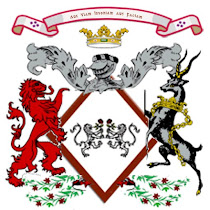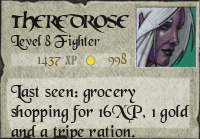and other selected works of William Butler Yeats
I have found myself, of late, reading a lot of Yeats. I have enjoyed a few of his poems for years, but am just now really becoming acquainted with the full scope of his life and his life's work. I find that I am enjoying tracing his life by the changing themes and tone of his poetry. Having found a number of very good biographical sites for Mr. Yeats here in the æther, I rather like the succinct nature of the following quote from the Nobel Lectures, Literature 1901-1967, Editor Horst Frenz, Elsevier Publishing Company, Amsterdam, 1969.
William Butler Yeats (1865-1939) was born in Dublin. His father was a lawyer and a well-known portrait painter. Yeats was educated in London and in Dublin, but he spent his summers in the west of Ireland in the family's summer house at Connaught. The young Yeats was very much part of the fin de siècle in London; at the same time he was active in societies that attempted an Irish literary revival. His first volume of verse appeared in 1887, but in his earlier period his dramatic production outweighed his poetry both in bulk and in import. Together with Lady Gregory he founded the Irish Theatre, which was to become the Abbey Theatre, and served as its chief playwright until the movement was joined by John Synge. His plays usually treat Irish legends; they also reflect his fascination with mysticism and spiritualism. The Countess Cathleen (1892), The Land of Heart's Desire (1894), Cathleen ni Houlihan (1902), The King's Threshold (1904), and Deirdre (1907) are among the best known.
After 1910, Yeats's dramatic art took a sharp turn toward a highly poetical, static, and esoteric style. His later plays were written for small audiences; they experiment with masks, dance, and music, and were profoundly influenced by the Japanese Noh plays. Although a convinced patriot, Yeats deplored the hatred and the bigotry of the Nationalist movement, and his poetry is full of moving protests against it. He was appointed to the Irish Senate in 1922. Yeats is one of the few writers whose greatest works were written after the award of the Nobel Prize. Whereas he received the Prize chiefly for his dramatic works, his significance today rests on his lyric achievement. His poetry, especially the volumes The Wild Swans at Coole (1919), Michael Robartes and the Dancer (1921), The Tower (1928), The Winding Stair and Other Poems (1933), and Last Poems and Plays (1940), made him one of the outstanding and most influential twentieth-century poets writing in English. His recurrent themes are the contrast of art and life, masks, cyclical theories of life (the symbol of the winding stairs), and the ideal of beauty and ceremony contrasting with the hubbub of modern life.

Although the bulk of his work was written after our particular time-frame of reference here in the Caledon of the 19th Century, the major themes and underlying struggles and joys are familiar to us.
In my previous post, I mentioned that my thoughts have been turning to romance (and spring) of late - and you will see some of that here - however, not all of the poetry I present for your enjoyment will fit that mold. These are just a sampling of what I have been reading; some have found particular personal meaning for me. Others have simply conjured brilliant images.
Enjoy.
MEN IMPROVE WITH THE YEARS
I am worn out with dreams;
A weather-worn, marble triton
Among the streams;
And all day long I look
Upon this lady's beauty
As though I had found in a book
A pictured beauty,
pleased to have filled the eyes
Or the discerning ears,
Delighted to be but wise,
For men improve with the years;
And yet, and yet,
Is this my dream, or the truth?
O would that we had met
When I had my burning youth!
But I grow old among dreams,
A weather-worn, marble triton
Among the streams.

A man and his lady-fair. Colonel Exrex Somme and his bride, Callipygian Christiensen
(From the RFL event in Loch Avie last season)
SOLOMON TO SHEBA
Sang Solomon to Sheba,
And kissed her dusky face,
'All day long from mid-day
We have talked in the one place,
All day long from shadowless noon
We have gone round and round
In the narrow theme of love
Like a old horse in a pound.'
To Solomon sang Sheba,
Plated on his knees,
'If you had broached a matter
That might the learned please,
You had before the sun had thrown
Our shadows on the ground
Discovered that my thoughts, not it,
Are but a narrow pound.'
Said Solomon to Sheba,
And kissed her Arab eyes,
'There's not a man or woman
Born under the skies
Dare match in learning with us two,
And all day long we have found
There's not a thing but love can make
The world a narrow pound.'
ON WOMAN
May God be praised for woman
That gives up all her mind,
A man may find in no man
A friendship of her kind
That covers all he has brought
As with her flesh and bone,
Nor quarrels with a thought
Because it is not her own.
Though pedantry denies,
It's plain the Bible means
That Solomon grew wise
While talking with his queens,
Yet never could, although
They say he counted grass,
Count all the praises due
When Sheba was his lass,
When she the iron wrought, or
When from the smithy fire
It shuddered in the water:
Harshness of their desire
That made them stretch and yawn,
Pleasure that comes with sleep,
Shudder that made them one.
What else He give or keep
God grant me -- no, not here,
For I am not so bold
To hope a thing so dear
Now I am growing old,
But when, if the tale's true,
The Pestle of the moon
That pounds up all anew
Brings me to birth again --
To find what once I have known,
Until I am driven mad,
Sleep driven from my bed,
By tenderness and care,
Pity, an aching head,
Gnashing of teeth, despair;
And all because of some one
Perverse creature of chance,
And live like Solomon
That Sheba led a dance.
AN IRISH AIRMAN FORESEES HIS DEATH
I KNOW that I shall meet my fate
Somewhere among the clouds above;
Those that I fight I do not hate,
Those that I guard I do not love;
My county is Kiltartan Cross,
My countrymen Kiltartan's poor,
No likely end could bring them loss
Or leave them happier than before.
Nor law, nor duty bade me fight,
Nor public men, nor cheering crowds,
A lonely impulse of delight
Drove to this tumult in the clouds;
I balanced all, brought all to mind,
The years to come seemed waste of breath,
A waste of breath the years behind
 Thank you to Colonel Hotspur O'Toole for the use of these photos previously posted in Hibernia on the Skids.
Thank you to Colonel Hotspur O'Toole for the use of these photos previously posted in Hibernia on the Skids.THE LOVER TELLS OF THE ROSE IN HIS HEART
All things uncomely and broken, all things worn out
and old,
The cry of a child by the roadway, the creak of a lum-
bering cart,
The heavy steps of the ploughman, splashing the
wintry mould,
Are wronging your image that blossoms a rose in the
deeps of my heart.
The wrong of unshapely things is a wrong too great
to be told;
I hunger to build them anew and sit on a green knoll
apart,
With the earth and the sky and the water, re-made, like
a casket of gold
For my dreams of your image that blossoms a rose in
the deeps of my heart.
In balance with this life, this death.






0 comments:
Post a Comment